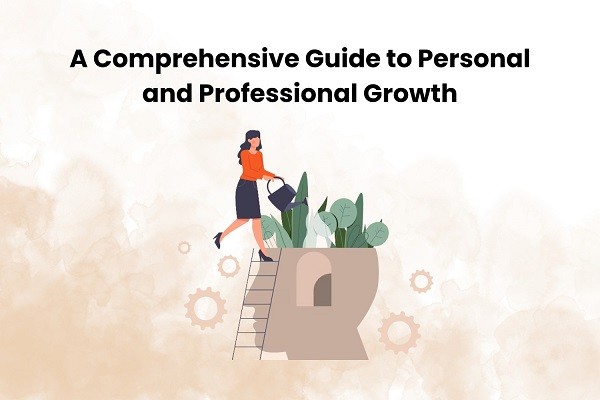A Comprehensive Guide to Personal and Professional Growth

The quest for professional and personal growth has become increasingly important in today’s fast-paced and competitive environment. To succeed in their personal and professional lives, people work hard to improve their talents, know-how, and overall capabilities.
In this blog, we explore techniques and insights to empower you on your path to success as we dig into the many facets of professional and personal growth. We will discuss the importance of Leadership Courses and answer the question, “What are Leadership Skills?” along the way.
Table of Contents
- The Impact of Personal Growth
- Setting Meaningful Goals
- Embracing Challenges
- Learning from Experiences
- Cultivating Self-Confidence
- Prioritising Well-Being
- The Importance of Professional Growth
- Skill Enhancement
- Building a Robust Network
- Strategic Career Moves
- Harnessing Technological Proficiency
- Fostering Leadership Skills Among Peers
- The Role of Leadership Courses in Professional Advancement
- Developing Emotional Intelligence
- Cultivating Strategic Vision
- Effective Communication Skills
- What are Leadership Skills
- The Essence of Leadership
- Conclusion
The Impact of Personal Growth
A person’s professional success is based mainly on their personal development. It entails an ongoing process of positive mentality development, self-improvement, and self-discovery. Important elements of personal development include accepting obstacles, setting meaningful objectives, and learning from experiences.
Setting Meaningful Goals
Establishing objectives consistent with your beliefs and ambitions is the first step towards personal improvement. These objectives act as guiding lights for you as you navigate life. Well-defined goals give one a feeling of direction and purpose, whether tied to educational objectives, professional milestones, or interpersonal connections. For individuals looking to balance work and personal life, finding opportunities that allow you to manage your own schedule can be incredibly beneficial.
Embracing Challenges
Both the personal and professional arenas will inevitably provide challenges. A defining characteristic of personal development is accepting problems rather than running from them. Every challenge presents a chance to grow, adapt, and overcome. “Smooth seas do not make skilled sailors,” as the adage goes.
Learning from Experiences
Life is an ongoing educational experience. Positive or negative, every event shapes who you become. You may become resilient, get new ideas, and improve your viewpoints by reflecting on these events. You can only really grow as a person by taking lessons from your achievements and mistakes.
Cultivating Self-Confidence
Building self-confidence is essential to personal development. Confidence in your skills and values gives you the courage to seek opportunities and overcome obstacles. Acknowledging accomplishments, drawing lessons from failures, and adopting a positive self-image are all part of developing self-confidence.
Prioritising Well-Being
When pursuing objectives, it is crucial to put one’s health first. Personal development is greatly aided by mental toughness, emotional equilibrium, and physical well-being. A meaningful and purpose-driven existence is built on a solid foundation of healthy habits, mindfulness, and great connections.
The Importance of Professional Growth
Although personal growth establishes the groundwork, professional growth includes skill development, network building, and calculated career choices. Let’s investigate the essential components of a successful career path.
Skill Enhancement
The foundation of career advancement is making investments in skill development. The skill sets needed to succeed in different sectors change along with them. Attending seminars and registering for relevant courses might offer you the skills and information you need to remain ahead in your industry. In particular, leadership courses are crucial in developing the skills necessary for professional growth.
Building a Robust Network
Effective networking is often necessary for success in the professional world. Developing deep relationships with peers in the industry, mentors, and coworkers leads to new possibilities. Your network may grow, and your job chances can be improved by participating in online platforms, attending industry events, and joining professional organisations.
Strategic Career Moves
It takes courageous decision-making and intelligent preparation to go up the job ladder. Sustaining your professional progress requires you to evaluate your strengths, pinpoint your areas for development, and take the initiative to look for new challenges. This tactical method entails having an open mind to new positions, sectors of the economy, or even regions that coincide with your long-term objectives.
Harnessing Technological Proficiency
In the current digital era, strong technology skills are essential for job advancement. Seize the chance to improve your digital abilities, keep up with technology that affects your sector, and use digital tools to automate tasks. A professional with strong technical skills is better able to adjust to changing market conditions and have a substantial impact on the performance of their firm.
Fostering Leadership Skills Among Peers
Professional development goes beyond personal success to encourage others to flourish. Encouraging a collaborative and leadership-oriented culture in your professional network improves your individual abilities and helps your team as a whole. Fostering leadership growth among coworkers improves workplace relationships and maximises the whole team’s potential.
The Role of Leadership Courses in Professional Advancement
Leadership training is essential for both professional and personal development. These classes concentrate on developing traits necessary for successful leadership beyond conventional skill development.
Developing Emotional Intelligence
Good leaders have strong emotional intelligence in addition to their technical prowess. Leadership courses often include modules on understanding and managing emotions, empathising with others, and navigating tricky social situations. Making wise judgments, developing cohesive teams, and creating solid connections depend heavily on emotional intelligence.
Cultivating Strategic Vision
Leadership is more than managing daily operations; it also entails developing a long-term strategic vision. Strategic thinking is a skill that leadership schools teach, enabling students to understand the broad picture, see patterns, and make judgments that support long-term objectives. Developing a strategic vision is essential for those who want to be in leadership positions in their businesses.
Effective Communication Skills
Good leadership is built on good communication. The development of effective communication skills, such as persuasive writing, active listening, and public speaking, is emphasised in leadership training. These abilities are crucial for motivating others, fostering a healthy workplace culture, and expressing ideas.
What are Leadership Skills
When we consider leadership skills, we see that being a leader is more than just a title or job. A person with leadership abilities and traits can mentor, uplift, and favourably impact others. It requires strategic thinking, good communication, and emotional intelligence.
The Essence of Leadership
Various qualities are included in the broad category of leadership talents, such as:
- Visionary Thinking: Effective leaders can see a situation in the future and motivate people to strive toward it.
- Adaptability: Skilful leaders can handle change with poise, modifying their plans as conditions change.
- Empathy: Developing solid interpersonal bonds and cohesive teams requires an understanding of and capacity for empathising with the thoughts, emotions, and viewpoints of others.
- Decisiveness: Analytical thinking, gut feeling, and a firm grasp of the objectives guide a leader’s choices.
- Resilience: Being a leader often entails overcoming obstacles and failures. Leaders who possess resilience can overcome obstacles and continue when things become challenging.
Conclusion
To sum up, developing oneself and one’s career is a dynamic process that calls for commitment to lifelong learning and hard work. Accept difficulties, keep developing your abilities, and think carefully about your job choices. Leadership courses accelerate this progress by emphasising strategic vision, effective communication, and emotional intelligence.
Remember that developing your leadership abilities is necessary for your path to success. Accept obstacles, never stop learning, and allow development to mould you into the finest version of yourself. The first step on your route to success is committing to grow personally and professionally.




